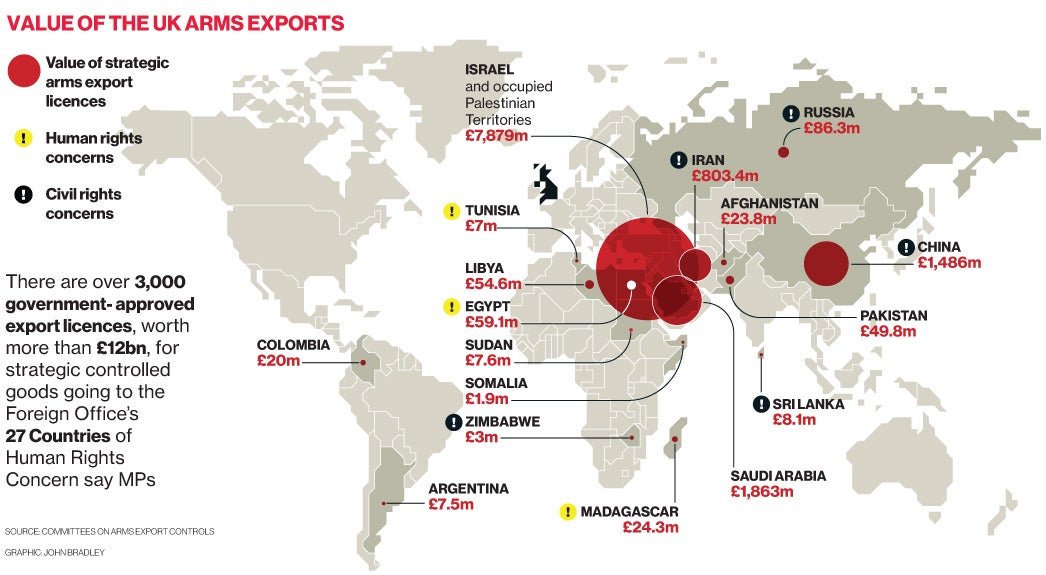British arms sales: A step towards transparency, but many more are needed
This information was only released through the efforts of one Committee


The publication by the Foreign Office of an annual report on human rights and democracy is a good thing. It does, however, also mean that it would be seen as hypocritical for the British government to supply arms and intelligence equipment to repressive regimes.
The fact that it has done so would not be a major surprise in the world of realpolitik. What makes it so astonishing is the sheer scale of it, more than 3,000 export licences worth a staggering £ 12.3 billion, to those on its own official list for abuse.
Sir John Stanley, the redoubtable chairman of the Committee on Arms Export Controls, a former defence minister, knew as a Whitehall veteran that expressions of good intentions by government are all too often not matched by deeds. After the Foreign Office began publishing its human rights reports he wrote to Vince Cable, the business secretary, to get details of the licences which have been issued.
“The figures involved would be so large – I thought someone may have added some zeros by mistake; £12bn is an absolutely huge sum. I asked Vince Cable to confirm they were accurate and, apart from a small adjustment for Iran, they all were” Sir John recalled. Further inquiries elicited that one contract alone, for Israel and the occupied territories, came to £ 7.7 billion.
For some of the items the catch-all words are ‘dual use’, components which can have both civilian and military functions. What we do not know is what they have actually been used for or, indeed, how much the British government knows about this. At a very basic level, the accountability of agents acting between the manufacturers and purchasers seem to be a very loose concept.
There are no ambiguities about some of the supplies. For example Sri Lanka — whose forces have been accused of rape, torture and murder of civilians — received assault rifles, combat shotguns, body armour and military vehicles. China, whose human rights record is routinely criticised by the UK, got components for military helicopters, military radars and lasers.
There are, actually, cases where supplying specific military material is justified despite unpalatable and disturbing developments taking place; the consequences of not doing so may be to make the situation worse.
The report states that Libya is receiving military equipment despite the bloodshed which is taking place there. But, in fact, the scale of that has been quite limited compared to what it could have been — just look at another ‘Arab Spring’ state, Syria. The fledgling administration in Tripoli needs the supplied forces to counter the militias and to try to tackle the strife. Afghanistan, too, is mentioned. Yes, there are rights violations taking place there. But the Afghan government is an ally fighting an Islamist insurgency and there is no evidence that cutting off supplies will suddenly lead to peace breaking out.
There is a debate to be had about whether there should be flexibility on individual countries. But for that to take place there needs to be what is singularly lacking on this matter; adequate transparency. We have only got these statistics thanks to the efforts of this particular Committee. One can only hope that in its response to the report the Government will be much more forthcoming than it has been hitherto. The public can make up its own mind about arms exports and human rights.

Join our commenting forum
Join thought-provoking conversations, follow other Independent readers and see their replies